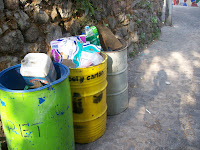lunes 20 de abril de 2009
Dirty Politics?
By Ben Pounds
Please note:
the version on the CGE blog has pictures, which I'm to lazy to include here. Also because of the more academic nature of this entry, I only dealt briefly with being attacked by bees after getting briefly separated from the group. My arm was swolen for a while after that.
That blog has a strict policy of having to ask permission of people before showing their faces, a rule that I should have followed here.
We were going to see Cuernavaca’s new landfill. We had left the edge of the city and now saw cows grazing. Then we hit what could only be described as a homemade checkpoint. A barb wire fence stretched across the street. After a few residents serving as guards opened the gate and our van passed, I had no clue what to expect.
The farmer who owned the land was happy to show us around. He opened yet another fence and let us walk through.
So, without setting foot in the landfill itself, we saw it. A grey hill above the canyon with trucks coming and going.
The gate had not been meant to stop us from entering government property. It had been built to stop the government or its allies from coming in and coercing the residents out of their land. Really its main purpose, now that I look back was to prevent trucks with garbage from coming in.
I had not intended for this entry to be about politics primarily. Our partners, the bloggers in Thailand, had been writing about human rights and government accountability rather than environmental concerns. Politics here though is tricky as is politics everywhere. It may involve bribery, alliances, networks, and (if I am to believe what some people have told me with regards to the landfill) physical threats. In short it is like politics everywhere else. I would hate for what I write here to be misinterpreted as an insult to Mexican politics particularly. However, one can broadly say that the “perfect dictatorship” described during the years of one-party domination continues in some ways in today’s multi-party Mexico.
The landfill was itself an improvement on the previous open-air dump near an indigenous community. Not everyone has access to the services of the privatized, new garbage collection company, PASA (the privatization of garbage collection was a controversial move on the part of the government in recent years).
The rivers in some ravines, already places for dumping sewage, hold a great deal of garbage put there by the residents whose houses cannot be reached by garbage trucks. In some ways one could say that the landfill is an improvement over that system.
Studies say that the soil is too porous to protect the below-ground aquifers from possible leaching. Thus, the project deprives neighboring communities of the right to clean water as their water is now contaminated. The local government representatives that we met with countered by saying the lands do not contain very much fertile soil. They may not be very fertile although that does not stop people from raising corn, cattle, chickens, and (as I found out the hard way) bees.
Despite the vocal opposition all the political parties are in favor of the landfill, including the “Ecological Green Party” (a party here famous for its support of the death penalty).
When they proposed other sites, government officials said “go research them yourselves.” Perhaps the greatest motivation for the current site is that the contamination that results from the landfill flows into smaller, poorer communities and doesn’t directly affect the city of Cuernavaca.
Some local citizens have found their own solution in setting up recycling centers and small-scale water-treatment plants. Despite, or possibly because of, their general distrust of the city government, these people have received some government support, including the filming of a public service announcement. Yet they remain cynical. When asked about the sewage treatment plants in Cuernavaca created directly by the government, the creator of a small scale plant at a local school was quick to point out that they did not work.
As I watch the local citizens in the Cuernavaca area so actively engaged in their communities, I remain aware of my role here as a foreigner. The last thing I want to be is another invader in this country, so my own involvement has limits. However, in learning about the struggles of this place and of the people here working for a more just world, I am convinced that my involvement back in the U.S. will always be affected and inspired by the activists of Mexico.


